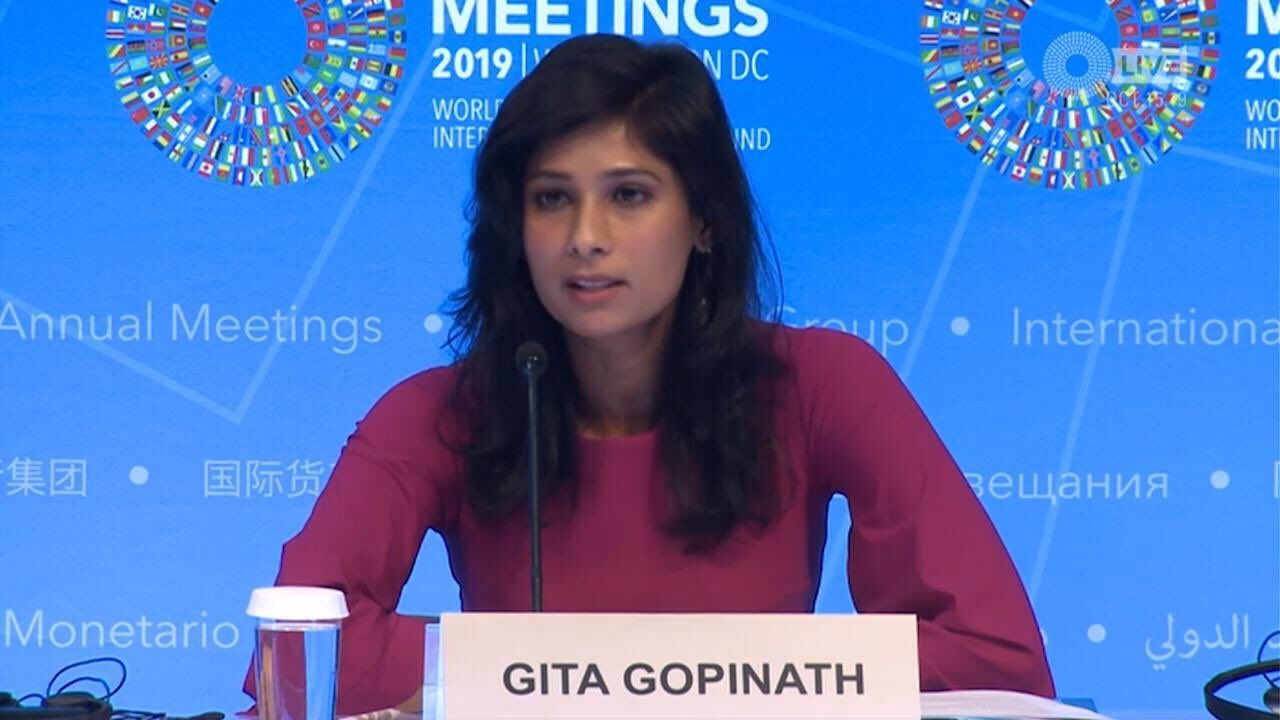Despite the Russia-Ukraine war and the resulting supply chain shock, the risk of a global recession is “low,” said Gita Gopinath, First Deputy Managing Director of the International Monetary Fund (IMF) to CNBC TV18 on the sidelines of the World Economic Forum 2022 in Davos Monday.
Simultaneously, the probability of individual nations entering a recession is “higher,” according to Gopinath, citing skyrocketing inflation, high crude oil prices, and capital outflows from emerging economies.
Also Read | What did Zelensky ask of business leaders regarding Russia at Davos
Other challenges, according to Gopinath, include inflation, central bank tightening of interest rates, and a slowdown in Chinese growth.
“So all of these provide downside risks to our forecast,” Gopinath said, with reference to the IMF’s 2022 growth forecast issued last month of 3.6%, a downgrade from a 4.4% estimate in January.
The IMF forecasted a severe decline in global economic growth. “Global growth is expected to drop from an anticipated 6.1% in 2021 to 3.6% in 2022 and 2023. This is 0.8 and 0.2 percentage points lower than in the January World Economic Outlook Update,” according to the IMF’s World Economic Outlook (WEO) report.
Also Read | What is Indo-Pacific Economic Framework?
“I would say at 3.6% there is a buffer,” she said, conceding, however, that risks are uneven around the world.
“There are countries that are getting hit hard … countries in Europe that are getting hit hard by the war, where we could see technical recessions,” Gopinath added.
The CEOs of numerous European blue-chip businesses earlier this month told CNBC that they expect a big recession in Europe.
The region is especially exposed to the effects of the Russia-Ukraine war, as well as the consequent economic sanctions and energy supply worries, and experts have been reducing eurozone growth projections in recent weeks.
Also Read | Quad summit: Key takeaways of the diplomatic meet in Tokyo
Simultaneous economic shocks from the Ukraine crisis and a jump in food and energy costs worsened by the conflict, as well as a supply shock from China’s zero-Covid policy, challenge the eurozone. This has raised fears of “stagflation,” or a period of sluggish economic growth and excessive inflation, and an eventual recession.
Gopinath said inflation “will remain significantly above central bank targets for a while”, adding: “It is very important for central bankers around the world to deal with inflation as a clear and present danger, that is something they need to deal with in a very forceful manner”.
Also Read | Kremlin critic Alexei Navalny loses appeal against 9-year jail term
The Reserve Bank of India (RBI) raised its repo rate by 40 basis points to 4.40 earlier this month. It also increased the Cash Reserve Ratio (CRR) by 50 basis points (bps) to 4.5%. According to the RBI, the “near-term inflation forecast is swiftly materialising,” and inflation is expected to continue high.
The US Federal Reserve raised its key interest rate by 0.50%, the largest increase in 22 years. The Fed also argued that inflation remained high owing to the Ukraine situation and additional coronavirus shutdowns in China, which threaten to keep pressures high.
In addition to the RBI and the US Fed, Saudi Arabia, Australia, Hong Kong, and the United Kingdom raised interest rates in April.
“Financial conditions could tighten much more rapidly than we’ve already seen. And growth in China is slowing,” Gopinath added.
China lowered a key interest rate last week to save its collapsing property market and avert a significant downturn in the world’s second-largest economy.
Also Read | Are there any treatments, preventive measures for monkeypox?
The People’s Bank of China lowered its five-year loan prime rate (LPR) by 15 basis points to 4.45%, the second decrease this year and the greatest on record. Most experts predicted a five-basis-point decrease.
“What is very important is for the Fed to watch the data carefully and respond at a scale that’s needed to deal with the incoming data,” Gopinath said.
“So if it turns out that inflation is especially broad … is going up, even more, they may need to react more strongly.”
Also Read | Why China views Quad as the ‘Asian NATO’
Interest rates are being raised to combat growing inflation, which is presently at an all-time high due to supply chain disruptions caused by the Russia-Ukraine war. High key rates make borrowing expensive, limiting the money supply for the purchase of risky assets.
High-interest rates reduce consumer and company expenditure, particularly on expensive things such as real estate and other luxury goods. It cancels out the wealth impact and makes banks more cautious about lending.
Also Read | Australia PM Anthony Albanese not China’s man, swears by Quad
Interest rates and inflation both move in the same way. Interest rates are raised as inflation rises. However, a slowing economy reduces inflation and may support rate cuts to stimulate growth.







